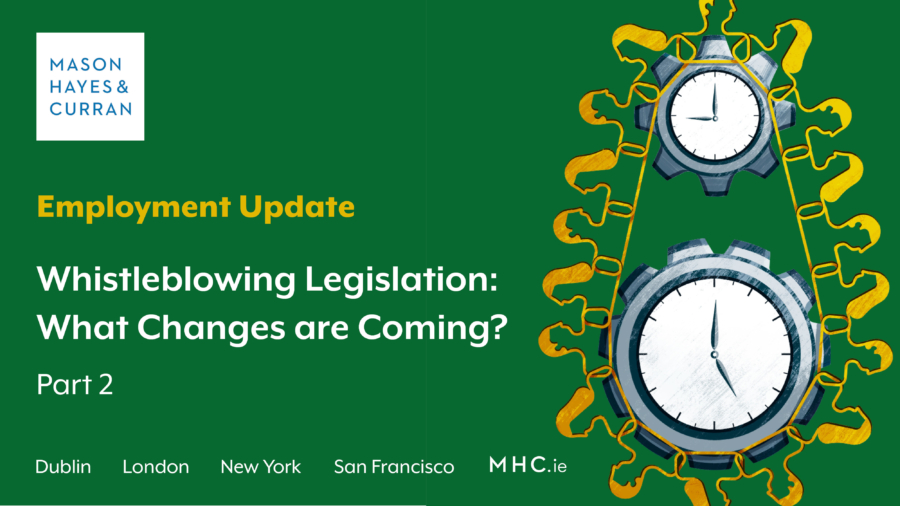
We review potential changes to protected disclosures in Ireland. We consider what steps employers might need to take in the future if changes are made to the Bill.
The Protected Disclosures (Amendment) Bill 2022 (the 2022 Bill) is intended to amend the Protected Disclosures Act 2014 (the 2014 Act). This is the second of a series of insights about the law as it relates to protected disclosures in Ireland in which we will discuss possible changes to the law if the Bill is enacted in its current form.
Substantial changes to the 2014 Act are required for Ireland to comply with EU law as it relates to protected disclosures. Therefore, it is important for employers to familiarise themselves with likely changes in order to be prepared when they become law.
What is a Protected Disclosure and how will that change?
Currently, under the 2014 Act, a protected disclosure is the disclosure by a worker of relevant information that came to their attention in connection with their employment, and which they reasonably believe tends to show one or more relevant wrongdoings. The definition of relevant wrongdoing contains eight types of wrongdoing. These include:
- That an offence has been or is likely to be committed
- That a person has failed, is failing or is likely to fail with a legal obligation (other than one arising from a contract of employment), and
- That the health or safety of any individual has been, is being or is likely to be endangered
The 2022 Bill will change the definition of relevant wrongdoing in a number of ways. The first is that it will include breaches of EU law in a number of areas including:
- Public procurement
- Financial services, products and markets, and prevention of money laundering and terrorist financing
- Product safety and compliance
- Transport safety
- Protection of the environment
- Radiation protection and nuclear safety
- Food and feed safety and animal health and welfare
- Public health
- Consumer protection
- Protection of privacy and personal data, and security of network and information systems, and
- Breaches that otherwise affect the financial interests of the EU or defeat the purpose of EU law
Secondly, instead of the information needing to have come to a worker’s attention in connection with their employment, it can now also come to their attention “in a work-related context”. While this may seem like semantics, it is necessary to ensure that persons such as volunteers and job applicants are protected from penalisation, as outlined in our previous article available here
The third change to the definition arises largely as a result of the December 2021 Supreme Court decision in Baranya v Rosderra Irish Meats Group Ltd. In that case, it was found that a complaint made by an employee about an issue which was personal to him but concerned workplace health and safety (which places statutory obligations on employers), could be considered a protected disclosure under the 2014 Act. As a result of this finding, the 2022 Bill will amend the definition of relevant wrongdoing to exclude “interpersonal grievances exclusively affecting the person making the disclosure”.
Complaints by a worker that concern interpersonal grievances between themselves and another worker, or their employer, will not constitute a protected disclosure. As a result, these complaints will instead be dealt with through other channels such as a workplace grievance procedure.
Conclusion
Understanding the type of complaint or disclosure which can constitute a protected disclosure, together with those which do not, is central to successfully managing disclosures in the workplace. While the 2022 Bill has not yet been enacted into law, employers are advised to start considering the provisions of the 2022 Bill so that they are ready to comply with the obligations it may place on them.
For more information and expert guidance on the likely impact of the Bill’s enactment on your organisation, contact a member of our Employment Law & Benefits team.
The content of this article is provided for information purposes only and does not constitute legal or other advice.







